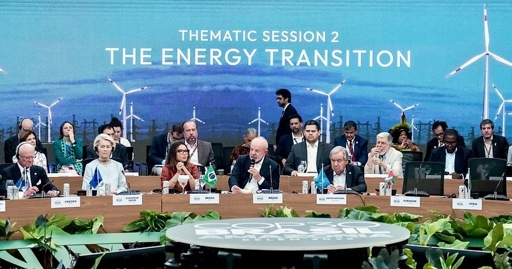The 30th Conference of Parties of the UN Framework Convention on Climate Change (UNFCCC), or simply COP30, began in Belém, Brazil on November 10, with greater focus on the implementation of the promises made so far and the role of the developing countries in it.
André Corrêa do Lago, president of COP30, underlined that the absence of the US has turned the focus to developing countries this year. He praised the developing countries, claiming they are the ones who are really moving ahead in the fight against climate change at a time when there is a reduction in enthusiasm by the wealthiest countries.
The world’s biggest historical emitter, the US, has decided to skip COP30 as President Donald Trump has repeatedly calls climate change a hoax.
Read More: Trump’s environmental policy champions big oil and gas interests
Andre highlighted the move undertaken by China to shift to renewable energy in a massive way in order to achieve global climate goals.
It has been widely reported that the COP30 host attempted to shift the focus from climate financing to unity in action. The reactions from the Global South, however, make it clear that these countries, already facing grave financial issues, have not dropped the agenda.
India, one of the major developing nations, for example, presented its official position during the conference which raised the demands of climate action based on equality, national circumstances and the principles of common but differentiated responsibilities and respective capabilities.
India emphasized that developed countries must accelerate the emission reduction and deliver the promised, adequate and predictable support to the developing countries to help them achieve the climate goals.
“Affordable finance, technology access, and capacity building are essential for implementing ambitious climate targets in developing countries. Equitable, predictable and concessional climate finance remains the cornerstone to achieve global climate goals,” the Indian representative at the conference said.
China made a similar call. Replying to a question on Friday, Mao Ning, spokesperson of the Chinese Ministry of Foreign Affairs said that “climate change is a global challenge that requires joint efforts of all parties.”
While listing the moves undertaken by China to fight climate change so far, Ning also underlined that “developed countries should step up to their historical responsibility, take the lead in drastically cutting emissions, and support developing countries in funding, technologies, and capacity building.”
Read More: China announces up to 10% reduction in greenhouse gas emissions by 2035
Developing countries need climate financing
The head of the New Development Bank (NDB) and former Brazilian president Dilma Rousseff acknowledged in preliminary proceedings last week, that climate disasters affect the poor more than the rich. She pushed for the need for differentiated responsibilities among developed and developing countries, underlining that all the promises made during the Paris agreement in 2015 must be fulfilled.
Though it is optimistic about the reduction in greenhouse gas emissions, projecting them to decrease by 12% by 2035 from 2019 levels, a UNFCCC report warns that if current policies continue, the global temperature may rise by 2.6 or 2.8 degree Celsius by the end of the century.
The new estimates are based on the fresh pledges made by China and the EU to reduce their greenhouse gas emissions, while the US under Trump continues to defy all the targets set collectively.
Dilma also offered NBD financing projects focused on innovation, environmental protection, and social development for just transition in the developing nations.
Given the financial status of the developing countries, most of them have huge external and public debt, it is difficult for them to prioritize projects related to climate change over the needs of development.
This is why they have pushed for climate justice, asking the historical emitters from the west to share their resources to achieve the common goals of reducing greenhouse gas emissions and curbing the rise in global temperature to 1.5 degree celsius.
The total annual expenditure required to meet global climate targets is estimated to be USD 7.4 trillion in the 2030s, according to a report in Reuters. Out of this, developing countries alone will need over USD 2.4 trillion annually.
In the last COP in Baku, a target of USD 1.3 trillion was set for developing countries, which will be the focus of the proceedings in Belém as well.
However, the target of an annual USD 300 billion in climate financing to the developing countries has not been achieved yet. On the contrary, it was only in 2022 that the world was able to achieve the 100 billion dollar annual climate financing target to the developing countries set in 2010.
There are proposals to tax polluting activities and convert sovereign debt into climate investment apart from boosting multilateral climate funds at Belém to increase climate financing.
The post Developing countries continue to push for adequate climate financing as COP30 begins in Brazil appeared first on Peoples Dispatch.
From Peoples Dispatch via this RSS feed


